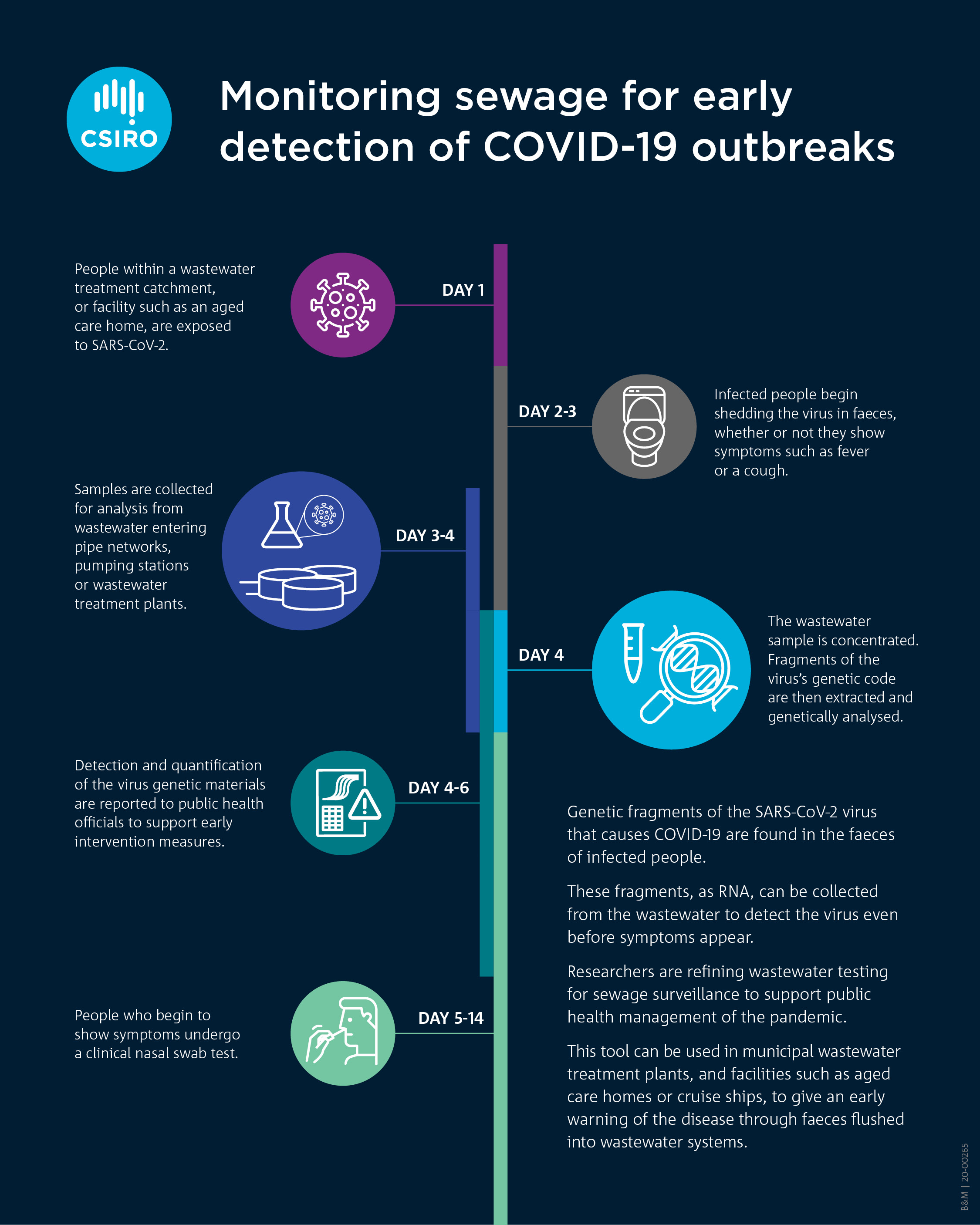Collaborative studies by CSIRO and The University of Queensland in early 2020 provided proof that wastewater surveillance could detect COVID-19 prevalence in a community.
Ongoing research refined the application of this science, providing evidence that wastewater (untreated sewage) testing can help inform local public health responses. This can occur as early as infected people begin shedding the virus in faeces, whether or not they show symptoms that prompt clinical testing.
The technique was adopted by many jurisdictions, helping to develop operational responses to COVID outbreaks. Information was provided to public health professionals to target specific areas for public health interventions and/or to gather information regarding the circulation of the virus in a community.
CSIRO and UQ supported Queensland Health with their wastewater surveillance program from July 2020, testing sewage for traces of the COVID-19 virus in dozens of locations across Queensland to enhance their response to the pandemic.
Wastewater monitoring helped disease surveillance and monitoring by identifying hotspots and allowing targeted localised public health responses, such as increased individual testing, setting up fever clinics, and providing health warnings.
The analysis involved tracking genetic fragments of the COVID-19 virus which were flushed into the wastewater system through infected people's faeces.
In collaboration with Qantas, the team also successfully demonstrated the approach for detecting infections within international travellers.

Collaborative studies by CSIRO and The University of Queensland in early 2020 provided proof that wastewater surveillance could detect COVID-19 prevalence in a community.
Ongoing research refined the application of this science, providing evidence that wastewater (untreated sewage) testing can help inform local public health responses. This can occur as early as infected people begin shedding the virus in faeces, whether or not they show symptoms that prompt clinical testing.
The technique was adopted by many jurisdictions, helping to develop operational responses to COVID outbreaks. Information was provided to public health professionals to target specific areas for public health interventions and/or to gather information regarding the circulation of the virus in a community.
CSIRO and UQ supported Queensland Health with their wastewater surveillance program from July 2020, testing sewage for traces of the COVID-19 virus in dozens of locations across Queensland to enhance their response to the pandemic.
Wastewater monitoring helped disease surveillance and monitoring by identifying hotspots and allowing targeted localised public health responses, such as increased individual testing, setting up fever clinics, and providing health warnings.
The analysis involved tracking genetic fragments of the COVID-19 virus which were flushed into the wastewater system through infected people's faeces.
In collaboration with Qantas, the team also successfully demonstrated the approach for detecting infections within international travellers.
People within a wastewater treatment catchment, or facility such as an aged care home, are exposed to SARS-CoV-2. Infected people begin shedding the virus in faeces, whether or not they show symptoms such as fever or a cough. Samples are collected for analysis from wastewater entering pipe networks, pumping stations or wastewater treatment plants. The wastewater sample is concentrated. Fragments of the virus’s genetic code are then extracted and genetically analysed. Detection and quantification of the virus genetic materials are reported to public health officials to support early intervention measures. Genetic fragments of the SARS-CoV-2 virus that causes COVID-19 are found in the faeces of infected people. These fragments, as RNA, can be collected from the wastewater to detect the virus even before symptoms appear. Researchers are refining wastewater testing for sewage surveillance to support public health management of the pandemic. This tool can be used in municipal wastewater treatment plants, and facilities such as aged care homes or cruise ships, to give an early warning of the disease through faeces flushed into wastewater systems. People who begin to show symptoms undergo a clinical nasal swab test.Monitoring sewage for early detection of COVID-19 outbreaks
DAY 1
DAY 2-3
DAY 3-4
DAY 4
DAY 4-6
DAY 5-14
Media releases and blogs
- Wastewater testing takes flight in the fight against COVID-19
- Australian researchers trace sewage for early warning COVID-19 spread
- Chasing COVID-19: CSIRO scientists find fast, cheaper way to find outbreaks in our wastewater
- Australian researchers track COVID-19 in wastewater from plane and cruise ship passengers
- Wastewater flushes out Covid-19 cases weeks before people show symptoms
- 22 Oct, 2021 blog- No time to waste in guarding against COVID-19
- 17 Apr, 2020 blog- New stool in the COVID-19 pipes
- 11 Sep, 2020 blog- Sewage testing for COVID-19? What’s that all about?
- 16 Oct, 2020 blog- Meet Dr Warish Ahmed, one of our COVID-19 researchers
- 22 Feb, 2021 blog- What does a positive wastewater test result mean?
